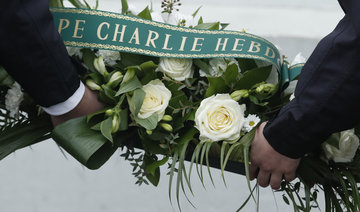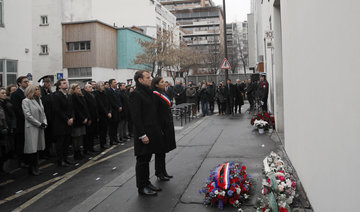PARIS: Fourteen people accused of helping terrorist gunmen attack the French satirical weekly Charlie Hebdo and a Jewish supermarket went on trial Wednesday, over five years after days of terror that sent shockwaves through France.
The attacks that began on Jan. 7, 2015 sparked a series of terrorist attacks on French soil, including “lone wolf” killings by people said to be inspired by the Daesh group that have since claimed more than 250 lives.
The weekly — whose taboo-shattering style makes it for supporters a beacon of free speech — in a typically defiant move in its Wednesday issue republished cartoons of the prophet Mohammed that had angered Muslims around the world.
The trial got underway at a special court in Paris and will over the next two-and-half-months hear from some 150 experts and witnesses in hearings that will again open up one of the most painful chapters in France’s modern history.
Although the three assailants were killed by police, prosecutors have rejected claims that the trial will focus only on “little helpers” suspected of providing weapons or organizational support.
“It is about individuals who are involved in the logistics, the preparation of the events, who provided means of financing, operational material, weapons, a residence,” national anti-terror prosecutor Jean-Francois Ricard told France Info radio on Monday.
“All this is essential to a terrorist operation,” he said, adding that relatives of the 17 victims and others would testify at the trial.
Twelve people, including some of France’s most celebrated cartoonists, were gunned down on Jan. 7, 2015, when brothers Said and Cherif Kouachi stormed the paper’s offices in eastern Paris.
A day later, Amedy Coulibaly, who became close to Cherif Kouachi while they were in prison, killed a 27-year-old police officer, Clarissa Jean-Philippe, during a traffic check in Montrouge, outside Paris.
Then on Jan. 9, Coulibaly killed four men, all Jews, during a hostage-taking at the Hyper Cacher supermarket in Paris. He recorded a video saying the three attacks were coordinated and carried out in the name of the Daesh terror group.
Coulibaly was killed when police stormed the supermarket. The Kouachi brothers were killed when officers carried out a nearly simultaneous operation at the printing shop where they were holed up in Dammartin-en-Goele, northeast of Paris.
“We will never lie down. We will never give up,” Charlie Hebdo director Laurent “Riss” Sourisseau, who was wounded in the attack and will attend the trial, wrote in an editorial published Wednesday.
The publication of the cartoons drew fresh condemnation from Pakistan’s foreign ministry, which said the decision to print them again was “deeply offensive.”
But French President Emmanuel Macron defended the “freedom to blaspheme” and paid tribute to the victims of the attack.
“A president of France should never judge the editorial choice of a journalist or editorial staff because there is freedom of the press which is rightly cherished,” he said on a visit to Beirut.
Christophe Deloire, the head of the Reporters Without Borders (RSF) press freedom group, hailed the decision to republish the cartoons.
“It is a courageous move and a very strong affirmation of their freedom of expression and their refusal to be intimidated,” he said outside the court.
The trial was originally set for last spring but was delayed by the coronavirus crisis that shut down most French courthouses.
Of the 14 suspects, three are being tried in absentia: Hayat Boumedienne, Coulibaly’s girlfriend, and two brothers, Mohamed and Mehdi Belhoucine, all of whom fled for IS-controlled areas in Syria or Iraq just days before the attacks.
The Belhoucine brothers were reportedly killed while fighting alongside IS, while French officials suspect Boumedienne is on the run in Syria. Arrests warrants remain outstanding for all three.
Mohamed Belhoucine and Ali Riza Polat, a French citizen of Turkish origin, face the most serious charges of complicity in a terrorist act, which carried a a maximum sentence of life in jail.
The former is thought to have become the ideological mentor of Coulibaly after meeting him in jail, opening up channels of communication for him to IS.
Polat, seen as close to Coulibaly, is suspected of playing a central role in preparing the attacks, notably by helping to build up the arsenal of weapons used.
Most of the other suspects are on trial for association with a terror group, a crime that comes with a prison sentence of up to 20 years.
Given its historical importance, the trial at the Paris courthouse will be filmed for France’s official archives, a first for a terror trial. It is scheduled to run until Nov. 10.






























